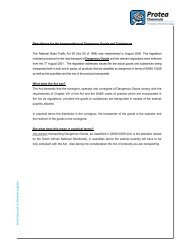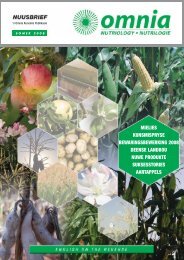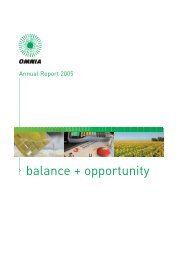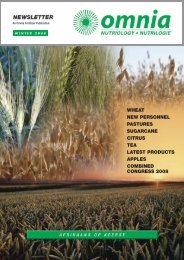omnia holdings annual report 2010 omnia holdings annu
omnia holdings annual report 2010 omnia holdings annu
omnia holdings annual report 2010 omnia holdings annu
You also want an ePaper? Increase the reach of your titles
YUMPU automatically turns print PDFs into web optimized ePapers that Google loves.
There has been a marked improvement in the fortunes of<br />
Unobhala High School since Zetachem stepped in with practical<br />
support in 2003.<br />
Zetachem, together with Protea Chemicals KZN and African<br />
Amines, have supported the school well beyond their original<br />
pledge, as we believe a properly functioning school is critical to<br />
this community. Our hope is to see the learners and community<br />
of Nkanyezini continue to benefit from the project and that the<br />
community and the learners use the opportunity to succeed.<br />
Education and infrastructure development support in Zambia<br />
During the period under review, BME Zambia built a school,<br />
which also functions as an orphanage, for about 60 children in<br />
the Chingola area of Zambia, close to the company’s offices. The<br />
project is of enormous value to the company and the<br />
community, as the intention is a genuine attempt to uplift people<br />
of the surrounding area where the company operates, and to<br />
OMNIA ANNUAL REPORT <strong>2010</strong> 53<br />
make a significant difference in the lives of generations to come,<br />
as true freedom and better livelihood choices are only introduced<br />
through access to improved education.<br />
Two full-time teachers ensure the learners receive relevant<br />
tuition, while BME funds the building maintenance and part<br />
of the running costs. The project is also important for BME<br />
employees’ morale, and both the country manager and financial<br />
manager are involved in looking after the project’s finances<br />
and infrastructure.<br />
Importantly, within each stage of building the school, various<br />
partnerships were established to ensure those community<br />
members involved in the project had certain responsibilities to<br />
undertake and achieve. Given that the people of the area are<br />
also involved in feeding schemes and brick-making, we believe<br />
this partnership will be long-lasting and sustainable. Founded on<br />
the principle of continued support, our integrated approach<br />
ensures the viability and success of the project.<br />
The table below reflects the Omnia Group’s socio-economic development spend for the year under review, compared to the previous<br />
two <strong>report</strong>ing periods.<br />
<strong>2010</strong> (R) 2009 (R) 2008 (R)<br />
Omnia Group 198 000 168 000 105 513<br />
Agriculture 493 604 525 972 746 592<br />
Mining 342 249 137 421 –<br />
Chemicals 1 083 600 1 285 574 446 000<br />
Total <strong><strong>annu</strong>al</strong> spend 2 117 453 2 116 967 1 298 105<br />
Economic performance<br />
The Group’s sound financial performance contributes to creating<br />
employment opportunities and to the socio-economic aspirations<br />
of South Africans through payments to governments, suppliers<br />
and employees, as well as investor returns (these contributions<br />
are enumerated in the value added statement on page 1).<br />
In the year under review, total economic value added by<br />
the Group was R1,2 billion, compared to R1,8 billion in the<br />
previous year.<br />
However, the unprecedented market conditions which prevailed<br />
in the 2009 financial year, together with a 23% stronger rand,<br />
led to depressed earnings in the year ended 31 March <strong>2010</strong>.<br />
Commodity prices continued their downward spiral into the<br />
second half of 2009. This, combined with lower levels of<br />
economic activity, led to all three divisions facing challenges from<br />
a combination of softer volumes, pricing pressures and weaker<br />
export prices. The subsequent reduction in earnings is amplified<br />
by the comparison with the unprecedented buoyant market<br />
conditions that had prevailed in the previous financial year.<br />
Although prices were significantly lower, volumes were<br />
maintained and cash generation was strong, giving us a robust<br />
balance sheet going forward.<br />
The commentary on the Group’s growth prospects included<br />
elsewhere in this <strong>report</strong>, specifically in the chairman’s statement<br />
and Group managing director’s review, provides a detailed view<br />
of how Omnia contributes to the growth of the sectors and<br />
geographies in which we operate. Our contribution to growth<br />
and development is made by providing specialised expertise and<br />
value added products to our customers, and also through our<br />
support of focused socio-economic initiatives.<br />
Promoting a vibrant agricultural sector in Africa is important not<br />
only in terms of food security and global competitiveness, but<br />
also in assisting small farmers to practice agriculture on a viable,<br />
commercial scale. The Agriculture division’s specific initiatives in<br />
this regard have been described in further detail from page 50.<br />
Mining is a crucial industry in Africa, given the continent’s<br />
substantial and as yet largely untapped store of mineral<br />
resources. In South Africa, precious metals account for about<br />
20% of total goods exports. The industry is also the country’s<br />
largest employer, with around 460 000 employees and another<br />
400 000 employed by the suppliers of goods and services to<br />
mining companies.<br />
South Africa’s chemical industry, which includes fuel, plastics<br />
fabrication and pharmaceuticals, is the largest of its kind in Africa<br />
and has been identified by the government as a key driver of<br />
economic growth. The industry dominates manufacturing in<br />
South Africa, adding more value to the economy than any other<br />
sector and accounting for over half of the jobs created by<br />
manufacturing as a whole. The development of the chemical<br />
industry in other African countries offers opportunities for further<br />
growth and diversification of their economies.














